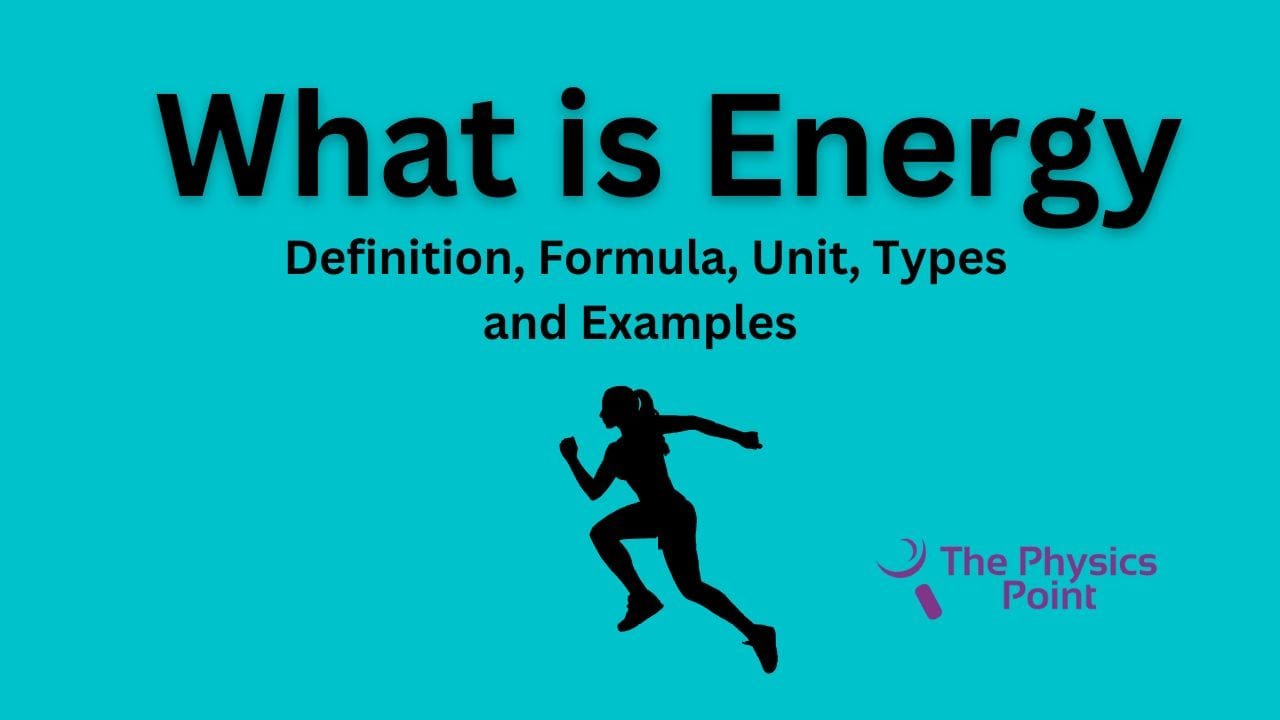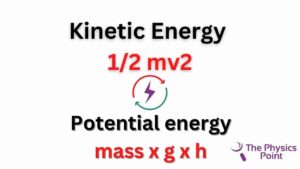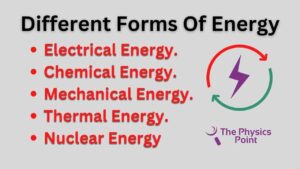What is Energy? Definition, Formula, Unit, Types and Example

Hello students you are very welcome to the Physics point. Everyone talks about energy. Very few people know the exact definition of energy according to Physics or science. In normal words, we can say that energy is used to perform any work. But this definition has a little changing which we will cover in the next paragraph of our article on what is energy. This article discusses some other forms of energy also besides kinetic energy and potential energy.
Today’s article what is energy discussed some important questions like what is energy in physics, what is energy definition, what types of energy and energy forms, what energy meaning, what energy power is, the definition of energy in science, different types of energy, energy examples, etc. We will also discuss thermal energy and sound energy in brief. Now without any time wasting let’s start our precious article what is energy?
What is Energy (Definition)?
The ability to perform Work is known as energy. There are many different forms of energy present on earth one of the most significant and elemental forms of energy is the sun in our Galaxy. According to the Definition of energy in science, energy is considered a quantitative value that can be transferred from a body to do work. We can also define energy as the ability and strength to perform any kind of physical activity.
You must know the fact that according to Physics and the law of conservation of energy, energy can neither be created nor destroyed in any condition but energy can be transferred from one form of energy to another form.
Units of Energy
The unit of energy is Joule. Joule is defined as the SI (International System of Unit) unit of energy. There was a great scientist named James Prescott Joule. The unit of energy Joule is named after his name. The definition of Joule is given as that when one newton of force makes an object displacement of 1 meter then the energy spends by the force is equal to 1 Joule. Energy has some other units also such as calories, kilowatt-hour, Kilo calories, ergs, etc.
What is the law of conservation of energy?
This law of conservation of energy is the fundamental and basic law of Physics. It states that for a closed system, the total energy of that system remains conserved. Here close system means a system that is totally isolated from its outer environment or surroundings. According to this law, energy remains conserved whether Energy transformation occurs or not. We can again state that energy can never be created or destroyed. We can only convert it from one form of energy to another form of energy.
Types of Energy
There are many types of energy in science. There are two main types of energy, Kinetic energy, and potential energy. We are going to describe below-
1. Kinetic Energy
When any object or system is moving, it possesses kinetic energy. It is also defined as subatomic particles. In this University every moving object must have kinetic energy, whether it is an atom or it is a big planet. The object which has kinetic energy is able to perform work. For example, think about a wrecking ball, when it is in motion this ball is capable of demolition of stones and buildings even if it is very slow moving but when this wall rests it cannot make damage anything, and thus it does not perform any work.
The formula of the kinetic energy
Kinetic Energy = 1/2 mv2
2. Potential energy
It is stored energy in any object or any system of objects. Potential energy can also be transferred or converted into kinetic energy which means both energies are interconvertible. First Kinetic energy and second potential energy are mechanical forms of energy. The formula of the potential energy is given below –
Potential energy = mass x g x h

Some other forms of energy
1. Thermal Energy
This form of energy can be experienced in the form of heat. We can understand it with examples very well. the energy that comes out from volcanic action is a good example of thermal energy. let’s understand it from another example. When you boil the water the temperature of the water is raised from the initial temperature and the water molecule is going here and there very fastly because of thermal energy. But this thermal energy is converted into kinetic energy of the molecule of water.
2. Sound Energy
It is also an important form of energy. when we hear anything the vibrations of the sound reaches our ear. When these Vibrations passed through the ear drum, the sound energy or vibrations are converted into an electrical signal and from here these signals send to the brain by our body system.

Frequently Asked Questions (FAQs)
Ques. What is the unit of energy?
Ans. The unit of energy is Joule. It is the SI unit of energy. But the commercial unit of energy is a kilowatt-hour.
Ques. What is the dimension of energy?
Ans. The dimension of energy is the same as that of work done. i.e. [ML2T-2].
Ques. Can we destroy the energy?
Ans. No, you cannot destroy the energy, and you’re unable to create energy. you can only change its form from one form to another form of energy.
Ques. What is the formula for kinetic energy?
Ans. The formula of kinetic energy is 1/2mv2. Here m is the mass of that be is the velocity of the object.
The Conclusion
we have discussed many important things about energy such as what is energy, all types of energy, the meaning of energy in science, what is the best definition of energy, what is thermal and sound energy, etc. These questions (energy-related) are very-very important from the competitive exam point of view. So you have to read the article carefully so that every concept of energy should be fitted in your mind forever. Thank you for it this article next day we will again meet with a new article on Physics.
